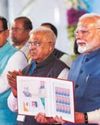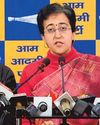
The literature on the role of agriculture in development concludes that structural transformation of economy is marked by decline in share of agriculture in economy's output and employment as an economy grows from low income towards middle and higher income. Based on this, policy emphasis for growth and development tilted towards non-agriculture sectors, specially manufacturing. The root of this line of thinking is traced to the work of British Economist Arthur Lewis (1954), who described economic development as a growth process of relocating resources from agriculture, characterised by low productivity and traditional technology, to modern industrial sector with higher productivity. This theory assigns very passive role to agriculture in economic development but it has been widely used by many developing countries to support industrialisation. In the post-Green Revolution period, some assumptions of Lewis model of development have been refuted. First, the green revolution shows that technology can play a significant role in modernising agriculture and in generation of surplus as visualised for the Industry. Two, the assumption of unlimited supply of labour in agriculture holds no more. These changes have implications for model of economic transformation from agrarian economy to industrialised economy.
Recent experience
Bu hikaye Business Standard dergisinin November 08, 2024 sayısından alınmıştır.
Start your 7-day Magzter GOLD free trial to access thousands of curated premium stories, and 9,000+ magazines and newspapers.
Already a subscriber ? Giriş Yap
Bu hikaye Business Standard dergisinin November 08, 2024 sayısından alınmıştır.
Start your 7-day Magzter GOLD free trial to access thousands of curated premium stories, and 9,000+ magazines and newspapers.
Already a subscriber? Giriş Yap

Pope urges 'all people of all nations' to silence arms
Pope Francis in his traditional Christmas message Wednesday urged \"all people of all nations\" to find courage during this Holy Year \"to silence the sounds of arms and overcome divisions\" plaguing the world, from the Middle East to Ukraine, Africa to Asia.
Women in auto sector grapple with low wages, surging finger injuries
The severity of injuries among women in India's auto sector has been rising steadily from 2019 to 2024, according to the latest report by the Safe in India Foundation (SIIF), released last Friday.

Regular staffers in CPSEs decline 3.14% in FY24
Share of contract workers rises 8.8% to 704,565 in the same period

AI to D2M—DPG 2.0 needs deep-tech action now
From artificial intelligence to direct-to-mobile broadcasting, India faces a technology strategy dilemma on whether to develop indigenous deep-tech ecosystems or to follow the lead on technologies developed outside India.

SURETY VS GUARANTEE
Surety bonds have begun to outshine bank guarantees. But did they come in too late?

10 Picks Tailored for 2025 Market Terrain
These stocks, handpicked by top brokerages, offer a blend of value and growth. After declining 13-37% from their 52-week highs, these scrips boast reasonable valuations and high return on equity, signalling strong upside potential. KRISHNA KANT outlines the blueprint for gains
Shah, Naidu, other NDA leaders meet at Nadda's residence
Leaders of the National Democratic Alliance (NDA) met at BJP president J P Nadda's Delhi residence on Wednesday on the birth centenary of former prime minister Atal Bihari Vajpayee.

PM Recalls Ambedkar's Vision, Slams Congress
Prime Minister Narendra Modi on Wednesday accused Congress of ignoring Dr B.R. Ambedkar's contribution to the development of water resources in the country as he laid the foundation stone of the Ken-Betwa river linking project in Madhya Pradesh.

AAP Schemes Disowned by Delhi Govt's Own Depts
After the Bharatiya Janata Party (BJP) and the Congress termed two of the Aam Aadmi Party (AAP)'s recently announced welfare schemes a hoax, two senior Delhi government officers issued public notices on Wednesday disowning these schemes.
Lock in long-term returns with non-par plans
With markets doing well for four years, many investors turned to unit-linked insurance plans (Ulips). However, with volatility increasing, traditional non-participating (non-par) insurance plans are gaining popularity for their guaranteed, tax-free returns.